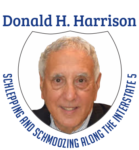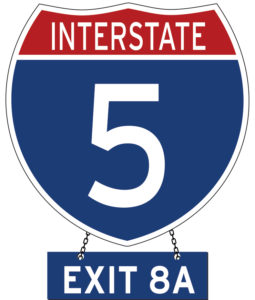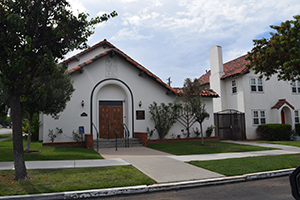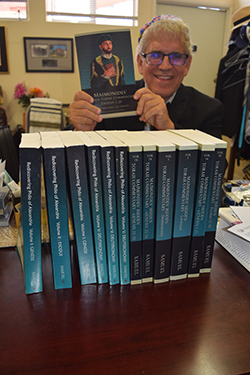Schlepping and Schmoozing Along the Interstate 5, Chapter 12, Exit 8A (H Street) Temple Beth Shalom

 From H Street exit, turn right (east) and go to 2nd Street, turn left, At Madrona Street, turn left again. Temple Beth Shalom is at the southwestern corner of the intersection at 208 Madrona Street.
From H Street exit, turn right (east) and go to 2nd Street, turn left, At Madrona Street, turn left again. Temple Beth Shalom is at the southwestern corner of the intersection at 208 Madrona Street.
We met Rabbi Michael Leo Samuel in the last chapter wherein he presented his views on ceremonies for the conversions of people to Judaism. Temple Beth Shalom is a Conservative congregation founded in 1958 and housed in the former St. John’s Episcopal Church. As its rabbi, he delivers sermons and teaches Torah to bar mitzvah students and people studying for conversion. He also leads congregants through other life cycle events such as brit milah (ritual circumcision), child naming, marriage, caring for the sick, burials, and shiva (the seven days of mourning). For adult males contemplating conversion who were never circumcised, undergoing the procedure is painful, but many of those who have gone through with it say that it was not as painful as they thought it would be.

Rabbi Samuel is also a prodigious author of books on Jewish religion, Jewish ethics, philosophy, and social issues. A recent book was God and the Pandemic, A Judaic Reflection on the Coronavirus.” Other works include sets of books on how both Philo and Maimonides understood each of the five books of the Torah. The two interpreters of the Jewish religion lived respectively in 1st Century Alexandria, Egypt, and in 12th Century Spain.

Samuel was 15 years old and living in the San Francisco Bay Area, when Rabbi Mayer Goldberg of Oakland arranged for him to attend Chabad summer camp. Goldberg, who once had studied under Chief Rabbi Abraham Isaac Kook of Mandatory Palestine, recommended that Samuel read Three Jewish Philosophers. That book edited by Hans Lewy, Alexander Altmann and Isaak Heineman, examined the works of Philo, Saadia Gaon, and Yehudah Halevi. It set the future rabbi on a course of studying Jewish philosophers and theologians.
Rabbi Samuel stayed involved with the Chabad Lubavitcher movement for 14 years, including the time of his ordination, before moving on to the more liberal Conservative movement of Judaism. He included Greek in his personal doctoral studies curriculum at San Francisco Theological Seminary so that he might read Philo in the original.
Rabbi Samuel instructs that Philo of Alexandria was important both as a Jewish thinker and as a defender of the Jewish people. In the former capacity, Philo was influenced by contemporary Stoic philosophers of early Greece, who taught that those who understood the works of Homer – The Odyssey and The Iliad – as literal truth missed their true meaning: Homer really wrote metaphorically about the experiences of the soul, the passions, and the temptations. “Basically, the Stoics took a psychological approach toward the mythology they had been raised with and created a brand-new interpretation that appealed to people who were very intellectual and psychologically attuned,” the rabbi said.
During Philo’s time, Rome ruled Alexandria, but culturally, it remained essentially a Greek- and Jewish- populated city on Egypt’s Mediterranean coast. While an intellectual oasis, it also had many antisemites among its population, prompting Philo to serve often as a spokesman in defense of his fellow Jews.
Similar to what the Stoics did with Greek and Roman mythology, “Philo tried to create a new symbiosis between Judaism, Jewish ethics, and Greek ethics and Greek philosophy,” Rabbi Samuel said. “All of a sudden, the patriarch Abraham was not just a historical figure, he became an archetype of someone who is a true searcher of God, a man who has a great love for humanity.”
Rabbi Samuel said that many of Philo’s teachings influenced later rabbis, as can be seen in early Midrashic and Talmudic writings. However, said Rabbi Samuel, because books were not easily disseminated (this being many centuries before the invention of the printing press), Philo’s contributions were absorbed without attribution into the Oral Law. Also, later rabbis may have resented Philo, whose writings were critical of their religious predecessors.
Following skirmishes between Romans and the residents of Alexandria, Philo joined a delegation that sought to dissuade the Roman Emperor Caligula from insisting that a sculpture of him be placed in the Holy of Holies within the Second Temple of Jerusalem. “Had this occurred,” commented Rabbi Samuel, “the Jewish war against Rome would have occurred 40 years earlier than it did.” While Philo did not get to speak to the unpopular Caligula, one of the Roman emperor’s boyhood friends, Agrippa I, threw a party for Caligula, prompting the emperor to thank him lavishly for remaining a friend. Caligula asked Agrippa to name anything he wanted, and it would be granted. Agrippa urged him to retract his demand for his statue to be placed in the Holy of Holies. To do so, he warned, echoing Philo’s arguments, would trigger a war that would serve the Roman Empire no positive purpose. Caligula relented, and shortly afterwards was assassinated. Claudius became Emperor and named Agrippa to serve as his Client-King in Judea.
Rabbi Samuel said the story of Caligula offering Agrippa anything he wanted reminds him of the Purim story of King Ahasuerus and Queen Esther. In both instances, Jewish communities were saved.
Turning to his admiration for Maimonides, Rabbi Samuel said that he read Maimonides’ Guide for the Perplexed as a teenager, setting him on a course of studying the great medieval scholar.
“What made Maimonides unique was that he completely reinvented Judaism,” the rabbi said. “The Talmud had some of the most anthropomorphic descriptions of God that you will find – even more than in the Bible itself. Maimonides felt like an outcast, feeling that the rabbis made us sound like a bunch of intellectual troglodytes.”
Maimonides also was upset that the Talmud read like a stream-of-consciousness work, “nothing systematic about it,” Rabbi Samuel said. “There are arguments that are never resolved. … Maimonides wanted to come up with a replacement for the Talmud, a bold undertaking. He decided he would systematize and update the Talmud and arbitrarily decide which point of view he agreed with, which point of view he rejected, and which points of view he combined.
“He added something that did not exist in rabbinic literature,” Rabbi Samuel continued. “He added a philosophical, interpretive approach, and he made the ethics of Judaism much more basic than you could find in the Talmud here and there… Maimonides wanted to make Jewish ethics more meaningful, Jewish philosophy more reasonable, and like Philo, he took almost a Greek philosophical approach to some of the wildest stories he found in the Talmud.”
Maimonides did not specifically write commentaries on the Torah, but sprinkled through his writings – and those of his son Abraham ibn Maimon, who quoted Maimonides – were commentaries sufficient to enable Rabbi Samuel to codify them book by book of the Torah.
“I am a Jewish conversational theologian,” Rabbi Samuel said. “By that I mean I am interested in creating a dialogue between Maimonides and his critics. For example, in the book on Exodus, I examine (Baruch) Spinoza’s critique of Maimonides in great detail. They actually had a lot more in common than is commonly believed.” Rabbi Samuel also took into consideration the arguments against Maimonidean philosophy posed by Nachmanides, his greatest critic. Rabbi Samuel creates conversations between Maimonides and Nachmanides in his books and defends Maimonides against Nachmanides’ assaults.
“Maimonides said whenever you read about God speaking to someone in the Bible, you are talking about visionary experiences, as with Philo. A donkey did not speak to Balaam. When God speaks to Abraham, it is through his dreams. In this sense, God shows that Native American vision quests are very similar to the biblical phenomena of prophecy in the Bible. So, when a modern person is able to read all this, all of a sudden it takes on a new meaning. One of the innovative ideas that I introduce on the binding of Isaac – which has always troubled readers – is that the Akedah never happened; it was a visionary experience. When you have a dream, you may see yourself doing things you would never do, but every aspect of the dream – as Carl Jung would say – is full of profound symbolism.”
Rabbi Samuel said another aspect of Maimonides that he admires is that he believed “you have to be open to truth no matter where it comes from. Truth is truth and it does not have to be codified by a bunch of rabbis.”
*
Next Sunday, March 27, 2022: Exit 8B (E Street): Star-News
*
This story is copyrighted (c) 2022 by Donald H. Harrison, editor emeritus of San Diego Jewish World. He may be contacted via donald.harrison@sdjewishworld.com